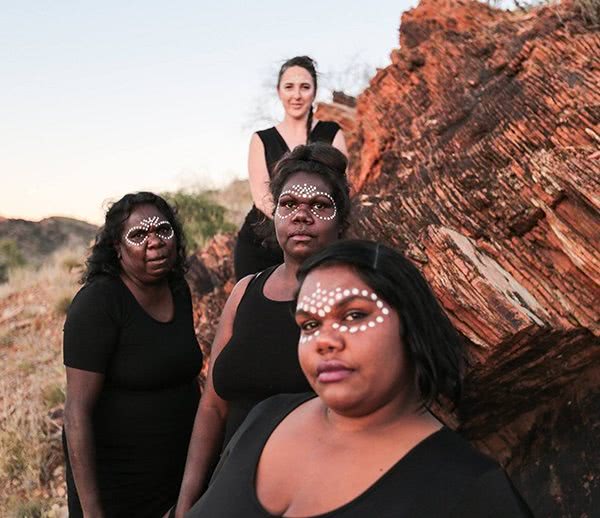‘Two Worlds Collide’ by Kardajala Kirridarra – the second track off their debut record Bardakurru Ngurra – is an apt summary of the artistic journey that birthed the seven-track album. The Northern Territory quartet, named after a bush woman from sandhills behind the community of Marlinja, sing in a combination of English and the Indigenous language Mudburra, and their songwriting merges traditional melodies and percussion with electronic production and elements of hip hop and dream pop.
Bringing these various musical formats and traditions together wasn’t exactly straightforward, but it’s resulted in a profoundly enthralling record, one that grew out of the personal and artistic connection of songwriters Eleanor ‘Nalyiri’ Dixon and Beatrice ‘Nalyiri’ Lewis.
“[The album] is a bit of a reflection of mine and Eleanor’s relationship,” says multi-instrumentalist, vocalist and producer Lewis. “That’s just naturally what I am, that’s just naturally what she is and that’s just what naturally happens when we came together.
“Eleanor [the project’s lead vocalist] has really great music taste. To meet someone in the desert who had really good taste, but who I could also show a bunch more music – and then Eleanor could show me a bunch of stuff that she liked and also take me on a bit of a cultural experience – it was a really nice coming together of different worlds.”
There was no decision to make something different.
The album was predominantly created in Dixon’s hometown of Marlinja in NT’s central desert. Lewis met Dixon when visiting Marlinja as part of the ‘Barkly Desert Cultures’ Multimedia program and the pair quickly established a mutually enriching songwriting partnership. Released mid-2017, the collaborative album is a truly signature collection of music that sounds contemporary and fresh, yet otherworldly and distinct as well.
“There was no decision to make something different,” says Lewis. “It was just me and Eleanor in a hall in Marlinja, sometimes in the heat, sometimes in the cold, sometimes in the rain; just making music and telling a story. It was Eleanor showing me songs that had cool synth sounds and me trying to replicate that sound. Eleanor’s dad makes amazing clap sticks so we were using them and using all these different sounds from around [the area].”
Kardajala Kirridarra’s songs typically feature pulsing beats and ethereal synths along with a melodic swirl of voices – not to mention both spoken word and rap sequences provided by MC Kayla Jackson. The group’s fourth member is Dixon’s aunty, Janey ‘Namija’ Dixon, who guaranteed an appropriate application of the Mudburra language.
“Sometimes we were writing the story in English, sometimes writing it in Mudburra, then working with Janey who’s the translator and elder,” says Lewis. “Eleanor and Janey would translate it and work on it and help bring it all together.
“We were just being honest and being ourselves. And maybe when you’re not trying to be anything by default you just make something unique.”
Lyrically, much of the album takes an up-close look at the lives of women, particularly within Indigenous Australian communities. The songs varyingly focus on a woman’s journey in the world, the place of women in society and how they ought to be respected and celebrated. And it’s this emphatic focus on the feminine experience that proved to be a major creative motivator throughout the writing of Bardakurru Ngurra.
“The first song that we ever wrote together was ‘Abala Barlawa’, which is the first song on the album,” Lewis says. “When we wrote that we were both enamoured with the collaboration. From there, Eleanor talked about wanting to tell story of an Indigenous woman and the cycles of life that she went through and that people go through. So, the whole seven songs are the story of a woman – not necessarily in order.
“It’s an important story and one that probably doesn’t get told that much, because we live in a very strong male society and their stories get told a lot. So it was a very conscious decision to be writing that journey, and it’s also the journey that Eleanor knows.”
Albums of this kind – a body of work containing honest, detailed and praise-oriented songs about women – are oft underestimated within the Australian music canon. Against this backdrop, Kardajala Kirridarra’s growing profile is of great significance. “When you hear stories of other people and there’s a deeper understanding, that’s when people can start to learn about each other and create understanding. I feel like that’s when greater empathy and peace and connection can happen.
Creating this beautiful music out in the desert, I was just really feeling it. And now in hindsight I can see it’s a really important story.
“You can watch certain issues on the news and it feels so far away, but when you actually hear peoples’ stories and connect with what’s actually happening human-to-human, that’s a really important way that humans can connect and create deeper relationships … I think that art and music are really good ways of doing that.” Music is indeed an invaluable tool for spreading empathy, and Kardajala Kirridarra are one of an increasing number of diverse outfits gaining traction in the Australian music scene. That said, Lewis admits to not being overly focused on the political weight of the record during its production.
“When we were making the album I was just having a really beautiful creative time with Eleanor and Janey and Kayla. Creating this beautiful music out in the desert, I was just really feeling it. And now in hindsight I can see it’s a really important story and I’m really glad that we’re going to tell it.”
Kardajala Kirridarra plays Yabun Festival this coming Friday January 26 at Victoria Park. Listen to Bardakurru Ngurra on bandcamp here.

































